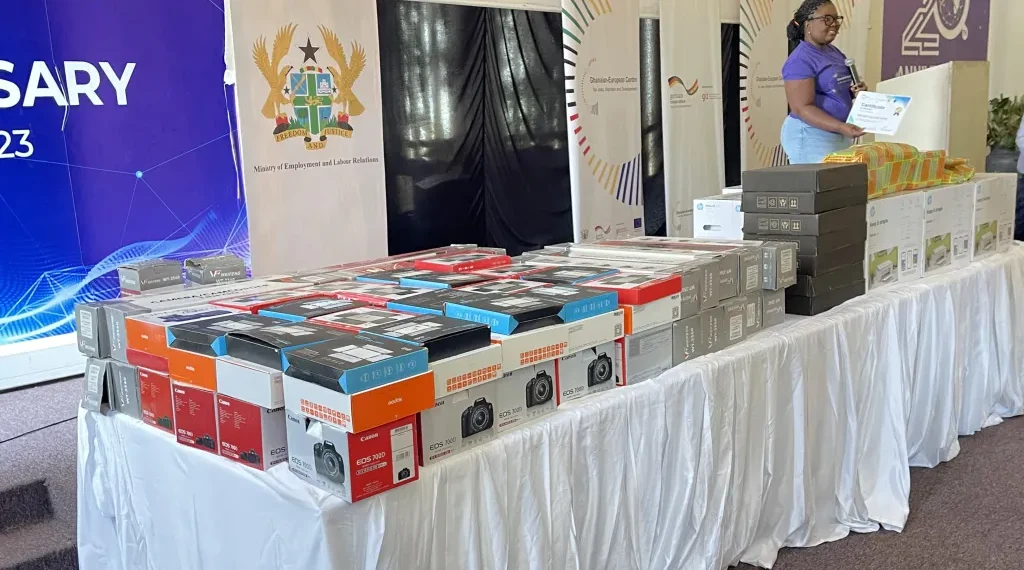The Ghanaian-European Centre for Jobs, Migration, and Development (GEC) has taken significant strides in providing essential skills training and start-up support for young people in the country.
Partnering with the Deutsche Gesellschaft für Internationale Zusammenarbeit (GIZ) Ghana, the GEC recently celebrated the graduation of 40 youths who underwent a comprehensive four-month training program.
The program, tailored to equip young individuals with market-relevant skills, focused on digital photography, videography, drone piloting, and graphic design. Notably, the initiative aimed to break gender barriers by encouraging female participation in traditionally male-dominated sectors. By empowering returned migrants and vulnerable local populations, the GEC sought to foster economic independence and address the looming challenge of youth unemployment.
One of the key highlights of the initiative was the provision of start-up support to the graduates. Recognizing the importance of access to equipment and resources for budding entrepreneurs, the GEC equipped the beneficiaries with essential tools, including laptops, printers, cameras, and other accessories necessary for their respective fields. This gesture not only facilitated the establishment of their businesses but also laid a solid foundation for their entrepreneurial journey.
Mr. Andreas Berding, the Head of GEC, emphasized the urgency of addressing youth unemployment, citing projections that close to 100 million youths in Africa could be without jobs in the coming years. Through strategic partnerships and targeted interventions, the GEC aims to mitigate the adverse socio-economic implications of rampant unemployment on the continent.
Central to the GEC’s mission is its commitment to promoting inclusive economic opportunities, particularly for women. By fostering an environment conducive to entrepreneurship and self-employment, the initiative seeks to empower women economically and socially.
Economic Empowerment, A Catalyst for Sustainable Development
Mr. Berding iterated that economic empowerment is a catalyst for sustainable development, emphasizing the importance of creating avenues for income generation and self-reliance.
Since its inception in 2017, the GEC has been at the forefront of providing skills training and support to vulnerable groups, including returned migrants and persons with disabilities. With a track record of empowering over 11,000 individuals and facilitating employment opportunities for thousands more, the GEC has emerged as a beacon of hope for Ghanaian youth.
Digital photography, in particular, has emerged as a lucrative avenue for young entrepreneurs in Ghana. With the rise of social media and digital marketing, there is a growing demand for high-quality visual content, presenting ample opportunities for skilled photographers to thrive in the market.
With backing from the BMZ and the European Union, over the past six years, the Centre has facilitated the establishment of more than 18,000 jobs for returning migrants and unemployed locals, spanning various skill levels. “We anticipate continuing our collaborative efforts with partners to extend economic opportunities and ensure a sustainable future,” remarked Mr. Charles Acquah-Moses, Managing Partner at YAMES Contract Works.
Mr. Acquah-Moses emphasized the significance of graphic design as a dynamic field enabling visual communication to convey brand identity. “Digital photographers capture fleeting moments and narratives that shape perspectives, urging graduates to harness design and photography to inspire and evoke emotions in their work,” he advised.
Encouraging perpetual learning, he expressed gratitude to the facilitators for imparting enduring knowledge. Certificates were conferred, with Mr. Edwin Adjei Adjetey recognized as the top performer.
Jessica Naa Borley Borketey, Cecelia Arthur, and Christabel Naa Ashorkor Amarh were distinguished as the outstanding female photography students, while Millicent Mensah Torkunoo, Isaac Annan, and Angela Annor excelled in graphic design.
READ ALSO: Critical Role of Agrifood Sector Stakeholders in Ensuring Food Security





















